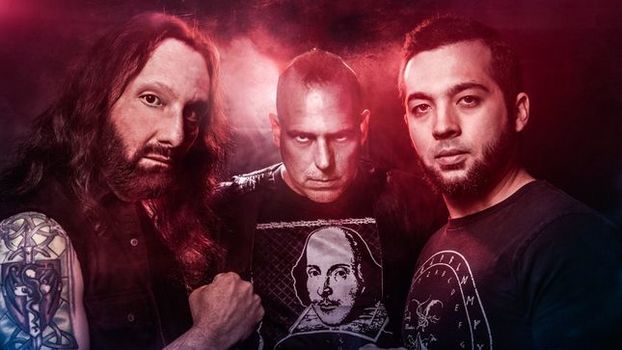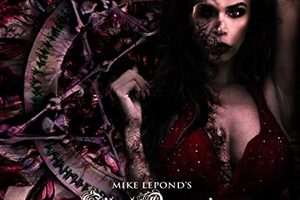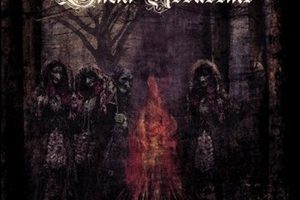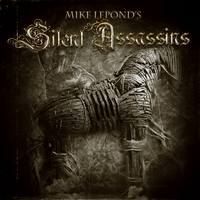Mike Lepond’s Silent Assassins – Creating Continuity
Sunday, 7th June 2020
Excelling at your instrument and garnering a reputation for your work allows you to make an impact in your niche, especially within the heavy metal genre. Case in point – Mike LePond. Probably best known to readers of this site for his years of work playing bass for Symphony X, his reach has taken him into projects, studio session work, and other bands that currently include Ross the Boss, DeadRisen, Eternity’s End, and Everdawn on the short list. He’s also been able to develop his own work with Mike Lepond’s Silent Assassins – which includes powerhouse vocalist Alan Tecchio (Hades, Nonfiction) in its ranks.
Whore of Babylon is the third album, another example of versatility and exploration as its still metal in its foundation, but willing to explore outside influences across the spectrum from Celtic/folk influences on through to progressive rock or deeper bass techniques developed on the title track. Add in more of his love of classic literature, history, and mythology for the lyrical side and the record reflects a love of music in general. We reached out to Mike one early morning and he was very happy to provide insight into specific guests and instrument choices for the record, his personal heavy metal journey and how things have changed with his outlook over the years, how he’s handling the down time, and what we can look forward to from him recording-wise in the near future.
Dead Rhetoric: Whore of Babylon is the third Silent Assassins album. How was the process of writing and composing this set of material – and did the success and approval of the previous discography give you more confidence with where you wanted to go this time around?
Mike LePond: Yes, I’ll answer the second part first. I got a lot of great response from the first two solo albums, so it motivated me a lot to write more and take the album where I wanted to. That was really great. The writing process for Whore of Babylon was very similar to the previous two albums. What I usually do is I demo the music, demo the lyrical melodies and write the lyrics. Build it from there – I record the album in Michael Romeo’s studio, the guitarist for Symphony X, and he recorded pretty much everything there. When that was finished, the same guy who mixed the first two (records) Eric Rachel, he mixed it.
It was the same kind of formula, I’m kind of used to it and it works very well for me and I’m very happy with it.
Dead Rhetoric: You also had Michael perform with a mandolin spot on the record, can you tell me how this came about?
LePond: I had this song that was like a Celtic rock song called “Night of the Long Knives”. I wouldn’t even try to play the mandolin, and that’s one of the great things about Mike. All these instruments are in his house, and if he doesn’t have it in his house, he has all these other sounds available to him on his library in his computer. He got a mandolin, and I wrote the riff on the guitar, but I envisioned a mandolin playing it. It took Mike like two seconds and he knocked it right out. I thought it was fun, it’s a song that breaks up all the heavy metal attack and gives you … a style of music I really love. I’m a fan of Blackmore’s Night and Renaissance music, Celtic music, medieval music. A lot of the stuff I write, you hear traces of that.
Dead Rhetoric: Were there any particular tracks that were more difficult or challenging to develop than others this time?
LePond: That’s a good question. The title track was very challenging because what I had is a four-string bass and an eight-string bass on the same song. That’s something that usually is not done, so I was figuring out how to make it work, because of the low-ended instruments. I worked with different strings and where to put them to give it a little bit of that high sound as well. I didn’t want it to sound all low and dull. There’s no guitar in the song either. I never really tried this before and I had no model to really reference this after. After a bunch of tries, I think I got it right and it’s definitely one of my favorites. It has that Middle Eastern, belly dancer kind of feel.
Dead Rhetoric: You are now on Silver Lining Music for this record. Considering your history in the music industry as well as the responsibilities changing for labels compared to say the 80’s, 90’s to early 2000’s – what do you look for most when it comes to signing with a label for your work?
LePond: I just want to make sure that they do not take the publishing. I want to make sure that the merch, I will control. It’s a fair split deal. I prefer to have a licensing deal rather than an actual record deal. And I have to say Silver Lining has been so amazing. I’ve never been treated so well in my life. One thing I’m not good at is social media, and they are helping me with all of that. They are very hands on, and for the first time I really feel like somebody is behind the album. They are really working with me and promoting it hard. The deal that we did was very fair and I’m very appreciative of it.
Dead Rhetoric: Can you tell us about the guest appearance from Sarah Teets of MindMaze on the record – as I know you have worked with her main band in the past recording bass on their Back to the Edge album? Do you enjoy adding some of these musicians to your work based on their skillsets and strengths as additional flavoring to execute your ideas to the fullest?
LePond: Yeah, and that’s a very good way to put it. It gives the extra flavoring. The background to that- I originally gave that song to Alan Tecchio to sing. And then he came back to me that the song would probably sound better sung by a female. I thought about that and it sounded like a cool idea. Like you said, I had worked with Sarah in the past and I always liked her voice and thought she would be great. And she plays the flute, which is awesome. I invited her to do the track, she came out to Michael Romeo’s studio, knocked it out in two hours. I think it came out cool, and it’s another one of those songs that gives it a little more depth and breaks up all the heavy stuff going on.
Dead Rhetoric: It looks like you continued to draw from the well of mythology, history, literature, and horror lyrically on this record. How does the songwriting process work for you in this band – do you work best from the music first, then lyrics – or are both being developed and refined concurrently?
LePond: Yeah, that’s a very good question. When I was younger, I always used to write the music first. It is what it was. I would see if I would hear some melodies or words in my head to think what to write about. This album, I had the lyrics first – and I found that actually it works better for me. I never really thought about it. If I write the music second, I can create things like a movie score for the lyrics. With the lyrics being like a little movie, and if there is a sad part in the lyrics, I’ll write something sad- if there’s a dark part, write something dark. It created a lot of continuity. I think I’m going to keep doing that. There are going to be some songs where I write the music and the lyrics become more in your face, which is cool. But you can get a lot more emotion in there when you have the lyrics first, at least for me.
Dead Rhetoric: How did the cover art piece come about? Did you have a specific woman in mind that the artist used as a model, and then develop the symbols around that?
LePond: The art I wasn’t 100% sure what to do – so I told my artist what the name of the album was going to be and some background on the subject matter. The one thing I did not want was a fantasy art cover. I feel too many bands do that, and I wanted my cover to feel more retro. We played around with some things, and eventually… we had the model full body, and we just settled on the face. I did not have a model in mind. My artist Melissa did all of that – I was just approving, disapproving, and making changes. In the end I thought it came out pretty cool. A basic, horror kind of cover – it kind of reminds me of the 1980’s.
Dead Rhetoric: Considering you had tour plans all across Europe and North America for both Ross the Boss and Symphony X shut down because of the current global pandemic, how has Mike LePond pivoted and course corrected to stay busy, maintained and focused? Do you believe you’ll seek out more session work/ side action in the interim until things return back to semi-normal?
LePond: Yeah. For me that was financially crushing. Because actually, what happened was I just moved into a new home. I figured with the two tours, I would be really good. And then boom, just like that. I’m definitely struggling financially at this point. I haven’t heard of when these tours will be rescheduled. I’m teaching for a local School of Rock remotely, through the Zoom app. That’s helping me get by a little bit, but sooner or later I’ll have to do more. It’s definitely hard. At this point I’m not 100% sure of what to do- I’m waiting to hear about the tours. Other than that, I’m taking it day by day.
Dead Rhetoric: How would you assess your own personal affinity for heavy metal or music in general now in your 50’s compared to say your 20’s and 30’s? Do you believe that you’ve just gotten better and wiser in regards to your personal development as a person and a player?
LePond: It is weird, because I look back to when I was in my twenties and I look back on how I would write and the way I would (think). When I was at that point, I was narrow-minded, I didn’t want to listen to anything else besides heavy metal. And as I got older, I started listening to other things, and that really helped me. I think joining Symphony X taught me so much about the craft of songwriting. It opened up a whole new world. I really don’t think I would be (making) good solo albums if I had not been in Symphony X. I’ve learned so many great writing techniques.
And another thing too is I try to listen to whatever is out there. I think too many rock stars, once they turn pro, they don’t want to listen to anything anymore, they don’t listen to other players anymore, and I think that kind of limits you. I try to keep my mind open, I listen to different bass players, different guitar players, different bands. Now I have the Symphony X writing experience in me, and I think I have gotten better as I’ve gotten older.
Dead Rhetoric: I was curious to know your thoughts on the progressive power metal project Eternity’s End where you played on their second album Unyielding – do you believe that was some of the most challenging material you’ve played on in recent times?
LePond: Oh hell yes! When they first contacted me, they told me all about the band and asked if I would be interested. I listened to some of the stuff and it sounded really great. It’s weird, you don’t realize sometimes how difficult stuff is until you sit down and learn it. They sent me a bunch of songs off the album, and I have to admit I was intimidated. What I did is took my time, being in Symphony X I recognized the techniques. I was 50% there right off the bat, but it was very technically challenging. The one thing about it is, the riffs were relentless. They never stopped coming, riff after riff after riff after riff- and it was really a lot. I have to hand it to those guys, incredible talent. It was an honor to play on that record – I think it’s an awesome record.
That was incredibly challenging, and those guys are mega-talented.
Dead Rhetoric: What do you think are some of the most common mistakes or missteps that you see younger musicians making in the metal genre that maybe they should think harder about or hopefully avoid?
LePond: When I think about that I think about myself and when I was younger like that. I think younger musicians, whether you play metal or rock, you should always keep up with what’s going on. Keep up with newer bands, newer players, listen to other styles of music. Probably the most important thing, don’t try to master the hard stuff first. Most of the time, when you try to master all those really hard licks, you are not even going to use them all that much. Just learn the basics, the language of your instrument, and learn the basics of songwriting – and slowly build it. Don’t go backwards, because you aren’t really going to even understand what you are playing. You just lock into a certain kind of box that you’ve put yourself in.
Dead Rhetoric: Who are some bass players that you admired when learning and helped shape your outlook and technique about the instrument?
LePond: When I first started learning the instrument, I was 13. And the first band as a 13-year old, you have to think back to how a (teenager) thinks, I immediately saw Kiss with Gene Simmons spitting fire. I learned Kiss songs, and believe or not that was a really good training ground because his stuff in the 1970’s had a lot of cool walking bass stuff. It wasn’t too difficult, and I could learn it and use it in other things I was doing with other bands. Of course being a metal guy I got into Geezer Butler from Black Sabbath, Joey DeMaio of Manowar, Steve Harris of Iron Maiden, Geddy Lee from Rush. I took those influences, and as I got a little older I started listening to Blackmore’s Night a little bit and I would listen to what Ritchie Blackmore was doing on the guitar and try to do it on the bass. That opened up a whole new bass playing thing for me.
I continue to try to learn as much as I can. If I happen to catch something on social media, a bass player playing, I’ll try to at least understand what they are doing. That’s how I see it, keep growing and don’t limit yourself.
Dead Rhetoric: Are there plans to set up some shows for Mike Lepond’s Silent Assassins to support this record down the road – as I’d imagine it’s going to be a tight squeeze considering your primary activities on the road with Symphony X and Ross the Boss?
LePond: Yeah – Ross never leaves the road! (laughs). I definitely would like to tour with the Silent Assassins. We’ve never done a tour yet- we did one show about a year and a half ago. It was so much fun, the place was packed, and it was everything I was hoping it was going to be. When all this virus stuff goes away, I hope we can get some cool offers. Maybe open for a bigger band that can bring some people.
Dead Rhetoric: What’s on the horizon for you over the next year- I’d imagine more recording and session work?
LePond: Already this year in March you had a release with DeadRisen – and on the 13th, Ross the Boss. The Silent Assassins release has been changed to June 26th. I have a couple more releases this year. I have another band with Ross and Sean Peck called Death Dealer. That will be coming out, I don’t have a date. And another band called Everdawn from the East Coast area- that will be released sometime this year. A female-fronted project. I have a bunch of things going on there.
Will there be any touring this year? We have no idea. I hope… right now there’s a Symphony X tour in August in South America that hasn’t been canceled yet. That would really get me by, if I can get on that.
Mike Lepond’s Silent Assassins on Facebook


























